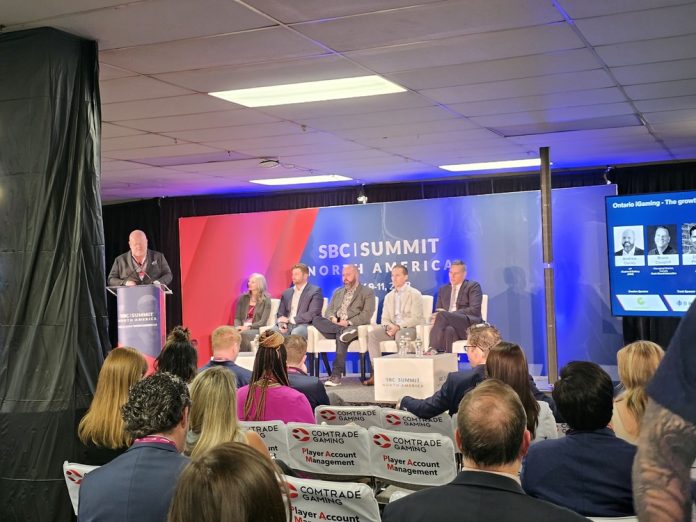The Ontario igaming market is arguably “number one in the world” in terms of revenue if the iGaming Ontario and OLG figures were combined, according to an official from the provincial lottery corp.
Andrew Darley, VP of iCasino and iLottery at OLG, made the claim on an Ontario-focused session at SBC Summit North America, and explained that OLG’s figures are confidential but substantial enough to challenge the biggest global markets.
He said: “I can’t give the full number, but we have continued to grow. I would say confidently, if you add our number to the iGO numbers, we are the number one market in the world.
“I think that’s important to understand the importance of having both the provincially-regulated group and the operators from all over the world.”
iGaming Ontario last month revealed that commercial operators in the province earned over $35bn in revenue during its first year of operations, placing it in the top five markets in North America for that particular metric.
Joining Darley on the panel was moderator Paul Burns, President and CEO of the Canadian Gaming Association, Dave Phillips, COO of the AGCO, Bruce Caughhill, MD of Canada at Rush Street Interactive, Marina Bogard, MD of North America at Betsson and Geoff Zochodne, Sports Betting Journalist at Covers.
Zochodne, who covers the industry for Covers, noted that US audiences perhaps underestimated the weight of Ontario’s power considering that OLG numbers are confidential, which are therefore not included in any public announcements.
He explained: “When iGO published the annual figures, they were kind of met, mostly, south of the Canadian border with the kind of shrugs because it didn’t include OLG numbers.
“I felt that there was a bit of a misunderstanding; there has been a really robust operation there since 2015. I feel like that when you do add OLG onto the competitive market, it does become much bigger.”
The conversation also included the regulatory framework in which Ontario’s market sits, with Dave Phillips thanking his fellow panelists for still being so welcoming to him one year into the market.
Phillips explained that the consultative nature of the framework has meant that operators are more likely to comply, given that they were heavily involved in the development of the regulations.
The COO of AGCO told the audience that real communication is key to building effective and meaningful regulation, noting: “Good regulatory policy is always made better if you engage in real, two-way communication. We did five rounds of consultation, and we had the benefit of (taking the) experiences of jurisdictions in other parts of the world.
“We also put in place a focused strategy in dealing with unregulated markets. We have 45 operators and twice as many suppliers. The level of interdependency is absolutely massive.”
Panelists from the operator side agreed that communication has been effective and has created a level market in which fairness is at its core.
A key example of this, according to Bruce Caughill, is the ban on advertising bonuses in the province. The Canadian lead for RSI, who is formerly of the AGCO, explained that it has forced operators to focus on having a strong product.
“It’s forced us all to market on products and offerings,” Caughill remarked. “As everyone says, it’s a level playing field. The one thing I would say is I think, as we move forward, is the interpretation of that restriction because I really do think it’s very important to continue to allow operators to market on product.”
Later in the panel, the discourse turned to what the market would look like in the future, with Ontario turning out to be a major battleground market, with over 40 operators and 76 websites/apps available.
As Ontario continues its growth, Burns asked whether the level of competition and innovation can be sustained in the mid-to-long term with so many operators vying for market share and attention.
For Bogard, the answer was simple.
I don’t think it’s sustainable, it will become a consolidation at some point,” Bogard told the panel.
“It’s really hard to be profitable if you are only a sportsbook. So you have to have multiple products like casino in order to get to profitability.
“When you look at the US market, it’ll start to consolidate and we’re starting to see some completely drop off. There will be the top three or four, and then you’re gonna have a few down at the bottom, and the rest are either going to get acquired or be out of business.”
Coolbet was the first operator to leave the Ontario market earlier this year as it approached one year of operation in the province, switching off before the end of March.













